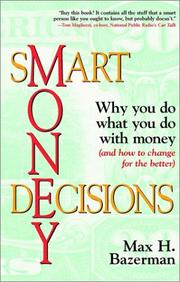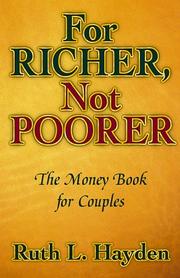| Listing 1 - 10 of 32 | << page >> |
Sort by
|
Book
Year: 1999 Publisher: Washington, DC : World Bank,
Abstract | Keywords | Export | Availability | Bookmark
 Loading...
Loading...Choose an application
- Reference Manager
- EndNote
- RefWorks (Direct export to RefWorks)
December 2000 Why do some households manage better than others in overcoming the impact of an adult death? The household's ability to cope is a function of the resources it can command, including its access to private networks for social insurance and credit. Public intervention can reduce vulnerability ex ante, or target assistance ex post, to the hardest-hit households. The AIDS crisis in Africa and elsewhere compels us to design appropriate assistance policies for households experiencing a death. Policies should take into account and strengthen existing household coping strategies, rather than duplicate or undermine them. Lundberg, Over, and Mujinja investigate the nature of coping mechanisms among a sample of households in Kagera, Tanzania in 1991-94. They estimate the magnitude and timing of receipts of private transfers, credit, and public assistance by households with different characteristics. Their empirical strategy addresses three common methodological difficulties in estimating the impact of adult death: selection bias, endogeneity, and unobserved heterogeneity. Lundberg, Over, and Mujinja find that less-poor households (those with more physical and human capital) benefit from larger receipts of private assistance than poor households. Resource-abundant households are wealthy in social assets as well as physical assets. Poor households, on the other hand, rely relatively more on loans than private transfers, for up to a year after a death. This suggests that credit acts as insurance for households where informal interhousehold assistance contracts are not enforceable. A donor in Kagera can be sure that assistance to a wealthy household will be reciprocated, whereas a poor household may not be able to return the favor. Assistance to the poor is more likely to come with more formal arrangements for repayment. Formal-sector assistance is targeted toward the poor immediately following the death. The impact of adult deaths on households may be mitigated either ex ante, through programs that minimize poverty and vulnerability, or ex post, by assistance targeted to the poorest and most vulnerable households. In addition, to the extent to which micro-credit programs improve access and lower the total costs of borrowing, they may not only stimulate growth and investment but also help resource-poor households overcome the impact of an adult death in the areas hard-hit by the AIDS epidemic. This paper--a product of Infrastructure and Environment, Development Research Group--extends research on the household-level impact of adult death which informed the World Bank Policy Research Report Confronting AIDS: Public Priorities in a Global Epidemic. The authors may be contacted at mlundberg@worldbank.org, meadover@worldbank.org, or pmujinja@muchs.ac.tz.
Book
ISBN: 030755404X Year: 1999 Publisher: New York, NY : Villard Books,
Abstract | Keywords | Export | Availability | Bookmark
 Loading...
Loading...Choose an application
- Reference Manager
- EndNote
- RefWorks (Direct export to RefWorks)
Book
ISBN: 0609607162 Year: 1999 Publisher: [Place of publication not identified] Three Rivers Press
Abstract | Keywords | Export | Availability | Bookmark
 Loading...
Loading...Choose an application
- Reference Manager
- EndNote
- RefWorks (Direct export to RefWorks)
Suze Orman has transformed the concept of personal finance for millions by teaching us how to gain control of our money — so that money does not control us. She goes beyond the nuts and bolts of managing money to explore the psychological, even spiritual power money has in our lives. The 9 Steps to Financial Freedom is the first personal finance book that gives you not only the knowledge of how to handle money, but also the will to break through all the barriers that hold you back. Combining real-life recommendations with the motivation to overcome financial anxieties, Suze Orman offers the keys to providing for yourself and your family, including: * seeing how your past holds the key to your financial future * facing your fears and creating new truths * trusting yourself more than you trust others * being open to receiving all that you are meant to have * understanding the lessons of the money cycle The 9 Steps to Financial Freedom is useful advice and inspiration from the leading voice in personal finance. As Orman shows, managing money is far more than a matter of balancing your checkbook or picking the right investments. It's about redefining financial freedom — and realizing that you are worth far more than your money.
Periodical
Abstract | Keywords | Export | Availability | Bookmark
 Loading...
Loading...Choose an application
- Reference Manager
- EndNote
- RefWorks (Direct export to RefWorks)
Finance --- Finance, Personal --- Finance. --- Finance, Personal.
Periodical
Abstract | Keywords | Export | Availability | Bookmark
 Loading...
Loading...Choose an application
- Reference Manager
- EndNote
- RefWorks (Direct export to RefWorks)
Investments --- Finance, Personal --- Finance, Personal. --- Investments. --- Australia.
Periodical
Abstract | Keywords | Export | Availability | Bookmark
 Loading...
Loading...Choose an application
- Reference Manager
- EndNote
- RefWorks (Direct export to RefWorks)
Investments --- Finance, Personal --- Finance, Personal. --- Investments. --- Australia.
Book
ISBN: 0786507829 Year: 1999 Publisher: [Place of publication not identified] Viking
Abstract | Keywords | Export | Availability | Bookmark
 Loading...
Loading...Choose an application
- Reference Manager
- EndNote
- RefWorks (Direct export to RefWorks)
Finance, Personal --- Finance, Personal --- Christianity --- Religious aspects.

ISBN: 9780471411260 0471411264 Year: 1999 Publisher: New York Wiley
Abstract | Keywords | Export | Availability | Bookmark
 Loading...
Loading...Choose an application
- Reference Manager
- EndNote
- RefWorks (Direct export to RefWorks)
Periodical
Abstract | Keywords | Export | Availability | Bookmark
 Loading...
Loading...Choose an application
- Reference Manager
- EndNote
- RefWorks (Direct export to RefWorks)

ISBN: 1558747184 Year: 1999 Publisher: Deerfield Beach Health Communications
Abstract | Keywords | Export | Availability | Bookmark
 Loading...
Loading...Choose an application
- Reference Manager
- EndNote
- RefWorks (Direct export to RefWorks)
Its unique approach does not offer a quick fix, rather, an evolutionary process that will teach you how to make your money life work in a way that fosters a strong, committed, lifelong partnership. You'll learn how to work together in a financial partnership focused on budget and cash flow. Even as your life as a couple changes and the numbers in your budget fluctuate, you will be able use the methods, strategies and skills you learn in this book for a lifetime. Learn the three most common communication responses couples use that do not work, the four cornerstones of a healthy money partnership, the two absolute rules of budgeting and the three negative consequences that result from living without defined couple goals and mutual values. You will find a step-by-step structure for developing a workable budget that both of you can commit to emotionally and intellectually. Money matters are some of the most difficult areas for spouses to approach in an open and honest way. They are also some of the leading causes of breakups and divorces. This innovative, life-changing book will forever improve your relationship. You will find case studies from the authors consultation practice, along with examples and step-by-step practical instructions that you can use in your day-to-day life as a couple. The case studies will encourage and help you see that you're not alone.
| Listing 1 - 10 of 32 | << page >> |
Sort by
|

 Search
Search Feedback
Feedback About UniCat
About UniCat  Help
Help News
News